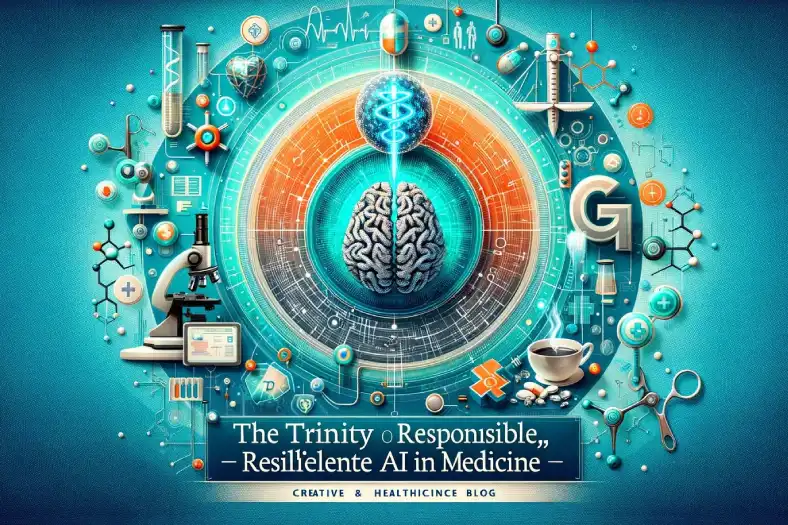In the ever-evolving landscape of healthcare technology, Artificial Intelligence (AI) has emerged as a beacon of hope, potential, and innovation. However, its successful implementation in healthcare hinges on adhering to what I like to call the “AI Trinity”: Reliability, Responsibility, and Resilience. Each of these elements is not just a feature but a fundamental necessity for AI to positively transform healthcare.
Reliability: The Cornerstone of Trust
Reliability in AI systems is paramount, especially in the high-stakes realm of healthcare. In this context, reliability translates to the accuracy and consistency of AI systems in diagnosing, predicting, and treating medical conditions.
Why High Reliability Matters:
- Error Reduction: In medicine, the cost of errors can be life-altering. Reliable AI can significantly reduce diagnostic and therapeutic errors.
- Data Quality: AI systems are trained on large amounts of data, and the quality of this data is critical for their reliability. Data should be accurate, complete, and representative of the patient population to ensure that AI systems can make informed decisions.
- Trust Building: When AI systems consistently perform well, they earn the trust of healthcare providers and patients alike.
- Informed Decision Making: Reliable AI provides actionable insights, enabling better-informed clinical decisions.
- System Redundancy: AI systems should incorporate redundancy to prevent failures and maintain continuity of service. This involves having backup systems or fail-safe mechanisms in place to ensure that AI-powered healthcare services remain operational.
Responsibility: The Ethical Compass
As AI systems become more involved in patient care, the focus on ethical implications intensifies. Responsibility in healthcare AI encompasses several key aspects:
Key Aspects of Ethical AI:
- Data Privacy and Security: With AI relying heavily on data, protecting patient confidentiality is non-negotiable.
- Fairness: AI algorithms should not discriminate against any particular group of patients. They should be designed to provide equitable and unbiased care, regardless of race, gender, socioeconomic status, or other factors.
- Accountability: Clear lines of accountability should be established for the development, deployment, and use of AI in healthcare. This ensures that there is a clear understanding of who is responsible for the actions and decisions made by AI systems
- Transparency and Consent: Patients and providers must understand how AI is used in care, respecting patient autonomy and informed consent.
Resilience: Adapting to Change
The ability of AI to adapt and evolve in response to new challenges and information is what we term resilience. In the fast-paced world of healthcare, this adaptability is critical.
The Pillars of Resilient AI:
- Cybersecurity: AI systems should be equipped with robust cybersecurity measures to protect against unauthorized access, data breaches, and malicious attacks.
- Data Security: Patient data should be stored and transmitted securely using encryption and other protective measures to prevent unauthorized access, modification, or disclosure.
- Scalability: As healthcare needs grow and change, AI systems must be able to scale accordingly.
- Flexibility: AI must be able to integrate new medical research and adapt to emerging health trends.
- Fault Tolerance: AI systems should be designed with fault tolerance mechanisms to handle system failures, recover from errors, and maintain continuity of service.
- Algorithmic Robustness: AI algorithms should be designed to handle noise, outliers, and unexpected situations in the data. They should be able to adapt to
- changing conditions and maintain their accuracy over time.
- Continuous Monitoring: AI systems should be continuously monitored for anomalies, potential vulnerabilities, and emerging threats to ensure prompt detection and response to security breaches or operational disruptions.
Looking Ahead: The Convergence of the Trinity in Healthcare AI
The convergence of reliability, responsibility, and resilience in healthcare AI is not just an ideal; it is a necessity. The future of healthcare, with AI at its core, promises enhanced patient outcomes, more personalized treatment plans, and improved operational efficiencies. However, realizing this future requires a commitment to these three principles.
- Interdisciplinary Approach: Collaboration between technologists, ethicists, healthcare professionals, and policymakers is essential.
- Continuous Monitoring and Improvement: AI systems must be regularly evaluated and updated to maintain high standards of reliability, ethical responsibility, and resilience.
- Public Engagement and Education: Building public awareness and understanding of AI in healthcare is crucial for its acceptance and success.
Conclusion: A New Era in Healthcare
The AI Trinity – Reliable, Responsible, and Resilient – sets a framework for the future of healthcare. By committing to these principles, we can harness the full potential of AI to revolutionize healthcare, making it more efficient, effective, and equitable. As we stand on the brink of this new era, it is the adherence to these principles that will determine the success and sustainability of AI in transforming healthcare for the better.



0 Comments